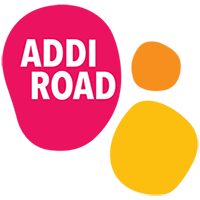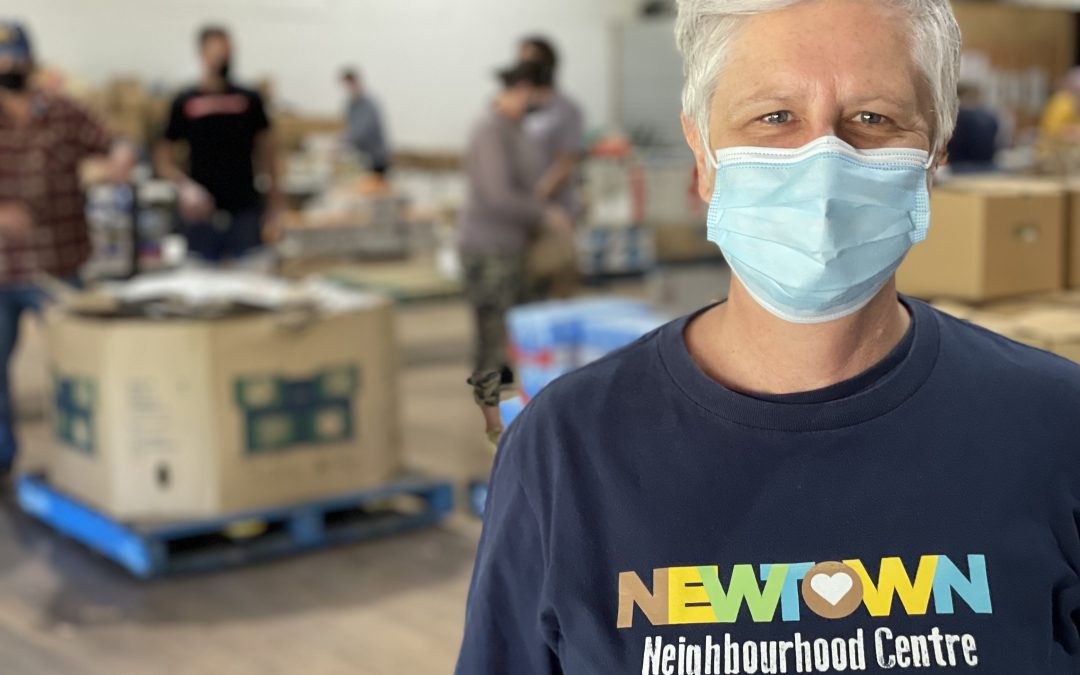“The inner west is the boarding house capital of Australia.”
So says Liz Yeo, CEO of Newtown Neighbourhood Centre. She’s down in Marrickville to pick up hampers from our Food Relief Hub. Soon enough a conversation between Yeo and Addi Road CEO Rosanna Barbero sparks ideas for a national campaign against inequality – and with it, a demand for a basic living wage.
Yeo believes that “this is the moment for local action”.
Over the last year she has been increasingly involved with a series of neighbourhood-focussed conferences and international zoom calls that only affirm, over and again, “how the local is being valued. Because it is at the local level you’re getting a useful and meaningful response to what is happening during the pandemic. Organisations on the ground like ours are the ones who are making a difference all over the world.”
Barbero agrees. “Since last year all the conversations I’ve been having, there is a change in the way people from place-based community organisations are talking when they are invited to speak with politicians and government groups. They are being listened to instead of struggling to be heard. And they are realising just how important they are – and how much it means when they speak about what is happening out there.”

Liz Yeo, CEO of Newtown Neighbourhood Centre, and Rosanna Barbero, CEO of Addison Road Community Organisation, making plans at Addi Road Food Relief Hub in Marrickville. Photo by Mark Mordue.
Yeo and Barbero are neighbours, quite literally, in Newtown. They’re close in other ways, too, sharing many of the same social justice concerns and a corresponding vocational commitment as leaders of their likewise close community organisations.
Both the Addison Road Community Organisation and Newtown Neighbourhood Centre have been working together for some time, all the more so since the pandemic began last year. Both involve themselves with cultural events as well as more urgent community actions. For Addi Road that means everything from art exhibitions at our StirrUp Gallery to events using the hall for the recent Addi Road Writers’ Festival and the Roady4Roadies benefit concert.
For Yeo, that now means figuring out what to do with the Newtown Festival, which usually attracts around 40,000 people. Over the last two years, the Newtown Neighbourhood Centre has had to cancel it due to COVID-19. Yeo is working on a community survey to figure out how to make it viable in the future – and not lose the magic that it brings. Do we have ideas? Can we help share the survey?
After coming here to pick up the food hampers, there’s an escalation of hope and power in the conversation Yeo and Barbero begin to develop. Currently Addi Road have 300 volunteers across 30 shifts a week, supplying over 30 different community organisations, local councils and police through our Food Relief Hub in Marrickville. Something big has happened here in the last year. But only because it had to.
Yeo recognises the change in mood at Addi Road, the mix of need followed by necessary action. It’s much the same for her just up the road. “We work primarily with people sleeping rough, or living in Boarding Houses and in other marginal private rental situations. The reality of the boarding houses can be brutal, she says. They are private businesses, and while some are reasonable, many are charging $200 plus, often “for a crap room” in unsafe, or at best unwelcoming circumstances. Stability is made all the more difficult when expenses for bills, food and medication are added in to the lives of people on benefits. Often the medication or decent food is the first thing to fall away. Many of those in boarding houses have mental health and addiction issues. As Yeo points out, “sometimes people can even feel safer sleeping rough on the street”.
“In a world where the social fabric seems to be rapidly fraying, the economy is uncertain, and the future of the planet is at risk, is there a better way to hit the reset button than to come back to the neighbourhood level and begin to rely on one another again.”
Barbero compares to this situation to data and anecdotal stories coming to us from the inner west and south west of Sydney as our own volunteers deliver weekly hampers. Reduced hours, job loss and illness have put many behind the eight ball. People are falling behind in their rent, with no hope of catching up. So far behind, they know that even if their work picks up there is no way they can pay off the ever-growing debt. A terrible and immense housing crisis seems to be looming with a likely tsunami of evictions. And while people sweat and worry over simply feeding themselves and their families each week, the so-called ‘shadow pandemic’ of anxiety and depression thrives with the imminent threat of homelessness.
This is not simply a problem affecting the lower classes. Mortgage stress is creating similar pressures as the same issues – job less, reduced hours, illness – hit everyone hard. People are in a nice house, driving a nice car, but it’s not so rosy for them either. As Barbero observes, “the privileged have come closer to those in poverty. It’s not easy out there even if you’re put on a brave face.”
Food hampers deactivate the stress and buy breathing space to figure out the next steps. Addi Road is already involved with a push to ‘Cancel the Debt’ and use the support of patrons to fill the gap for those we service and take care of their rental arrears – if we somehow can. It’s a matter of wanting to help, but far from a done deal.
Barbero and Yeo concur over the desperate circumstances and a need to look at the problem from above. “Band aid solutions,” as Barbero calls them, “won’t change the structural problems causing this.”
People simply do not have enough money to sustain a home and put food on their tables. Inequality is vast, extreme and growing. A living income has to be settled on. And community organisations are in a place to apply real pressure, most of all in swinging electorates where they do so much important work in the community. For the first time in a long time, there’s an inkling that despite the darkness of these times, it might just be that people really do have the power. And our politicians can be forced to listen.
A coalition of community organisations dedicated to the notion of a basic living wage is discussed. With a focus on weaving an alliance over the issue with community organisations in swinging seats at the next election. Many of these organisations are already familiar with one another, having worked more closely together than usual ever since the fires and right across the pandemic.
As Barbero points out, “we’ve seen the power of collaboration and community responses, community helping community”. By that she means the collaboration that comes from deep community connections and knowing what is really needed; and the way the bushfires and the pandemic have developed a stronger network between groups so localised they did not mesh as much as they might have otherwise.
Yeo admits, “I will be the first to confess you can get so involved in your own organisation it’s hard to look outside of it. There is always more happening than you can manage.”
Even so, a fundamental value strengthens “everything we do,” Yeo says. “We are relational not transactional. The transaction is secondary. People are always having to deal with it, register online, tick this box, we will contact you. But community organisations aren’t so focussed on those systems and their measures to define their successes and build genuine relationships that are productive and meaningful.”
Barbero agrees. “People are just screaming out to be recognised as human beings. They should be respected. They should be part of the response and part of the solution.”
Yeo hears the comment and gets excited. “I got one for you, Rosanna!” she says. Yeo offers up a quote that captures something of what she believes the two of them have been talking about. It’s from Jim Diers, a community organiser working on the same level all the way over in Seattle in the USA. Yeo was listening to him only a few days ago in a conference and wrote the words down:
“In a world where the social fabric seems to be rapidly fraying, the economy is uncertain, and the future of the planet is at risk, is there a better way to hit the reset button than to come back to the neighbourhood level and begin to rely on one another again.”
Food relief. Eviction moratoriums. Cancelling the debt on rental arrears during the pandemic. Restructuring our society with a basic living wage and greatly expanded, quality social housing. Addison Road Community Organisation and Newtown Neighbourhood Centre are talking. So are many others.


